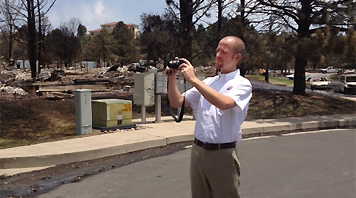|
RMIIA News Releases7951 E. Maplewood Avenue, Suite 110 Contact: Carole Walker, Executive Director Survey Shows Colorado Teens Text While Driving November 13, 2007 - Fifty-one percent of Colorado teenagers admitted to sending or receiving text messages while driving and 66 percent admitted to talking on their cell phone while driving, according to a survey conducted by the Colorado State Patrol, the Rocky Mountain Insurance Information Association, the Colorado Department of Transportation and AAA. The Colorado figures are much higher than those found in a recent AAA national survey, where the rates were 46 percent (texting) and 51 percent (talking). The web survey was offered to Colorado teenagers between Aug. 20 and Sept. 21. Four hundred and sixty Colorado teens from 84 different cities statewide responded to the survey, which also quizzed teens about their driving habits and knowledge of current state laws regarding cell phone use while driving. Other key results include:
"Our message to new drivers is very simple," said Colonel Mark Trostel, Chief of the Colorado State Patrol. "Just drive. Driving is a responsibility that requires your full attention. If you need to send a message or make a phone call, pull over and stop in a safe place and then send your message. And, remember to always buckle up yourself and your passengers." “Hopefully, the results of this survey will raise awareness of the problem of teen cell phone use while driving, and encourage parents to discuss this important issue and set a good example,” said Wave Dreher, Traffic Safety Specialist with AAA Colorado. The goal of the survey was to find out how Colorado teens compared to the national study and learn more about their perspectives and behaviors on cell phones and driving. By doing so, the safety organizations involved hope to create better, more effective educational messages that will have the greatest impact on teen driving behavior. A complete list of survey questions and results, as well as tips for parents on supervising teen cell phone use, is available on the Internet at www.aaa.com/teens. The website also lists some eye-opening anonymous comments left by teens who took the survey. The Colorado Department of Transportation (CDOT), Colorado State Patrol (CSP) and the Rocky Mountain Insurance Information Association (RMIIA) and AAA Colorado worked together to support the planning and publicity to generate teenage respondents. "The survey confirms that teens are less likely to text message while driving if they know there are consequences, such as losing their license and insurance," says Carole Walker, executive director of RMIIA. "Teens already pay the highest insurance rates and they need coverage to drive legally, so we are sending a message that one ticket or an accident caused by texting may make driving unaffordable or even off limits." The Colorado Department of Transportation also has a website devoted to teen driving safety issues and information at www.coteendriver.com. The CDOT website also has a parent-teen driver agreement which according to CDOT, can be beneficial for parents trying to educate their teenage drivers on traffic safety. “One thing parents can do to help keep their teen driver safe is to talk with them about safe driving habits and listen to their concerns and questions,” said Pam Hutton, CDOT Governor's representative for highway safety. “Ask them to join you in signing a parent-teen driving agreement. When information on the law, family rules, and consequences are written and agreed upon by parents and teens, young drivers are less likely to be involved in risky driving situations.” ### Rocky Mountain Insurance Information Association is a non-profit consumer information organization. Affiliated with the Insurance Information Institute, RMIIA has been serving consumers and the media since 1952. |
|
303-790-0216 • 800-355-9524 • Contact Us • Legal Notice, Disclaimer & Terms of Use
Home • About RMIIA • News Room • P&C Insurance Industry • Auto • Homeowners • Business • Catastrophes • Agent Resources • Events & Education • Brochures

